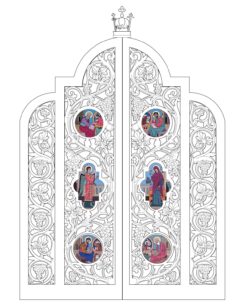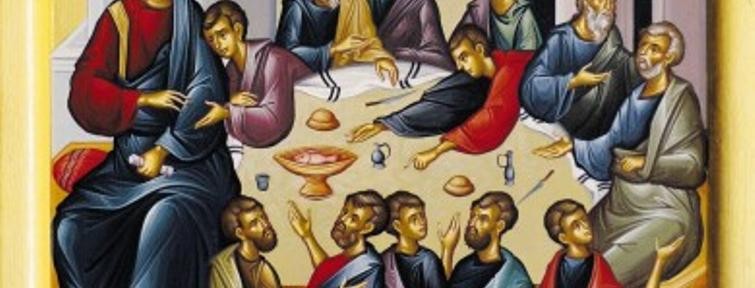Let us be honest, and admit that Holy Thursday in the Byzantine liturgical tradition is not entirely successful! The day has become overloaded, and what should be the principal theme has suffered as a result.
That principal theme is, of course, the Last Supper, at which Our Lord Jesus Christ gave us the Holy Eucharist. Nothing could be more obvious than that our main service of the day should be the Divine Liturgy, and that this Divine Liturgy should be in the evening.
And that is what the service-books prescribe. On Holy Thursday we have the Divine Liturgy of Saint Basil the Great, beginning with Vespers. The Triodion already prescribes that Vespers should begin earlier than usual, at 2:00 pm. But then matters became worse. Because of the Eucharistic fast from midnight, celebrations of the Divine Liturgy in the evening became less and less frequent, and finally ceased completely. The Council of Carthage (418 AD) and the Council in Trullo (691 AD) both legislated to maintain the evening Divine Liturgy on Holy Thursday, but eventually the contrary custom prevailed, and the Divine Liturgy, even with Vespers, was pushed back to the morning.
Since in most countries Holy Thursday is a working-day, the inevitable result is that relatively few people are able to come to the Divine Liturgy on Holy Thursday. Ever since the Catholic Church restored the possibility of evening celebrations of the Divine Liturgy, in the reign of Pope Pius XII, there have been suggestions to restore the evening celebration on Holy Thursday, and in fact this has been done in most liturgical traditions.
For the Churches of the Byzantine tradition, however, there is an additional problem. For centuries it has become customary to serve Matins of Great Friday, with the reading of the Twelve Passion Gospels, on the evening of Holy Thursday. Our faithful are strongly attached to this service, and attend it in large numbers. This means that the evening hours are already occupied with a lengthy service, which makes it difficult, if not impossible, to serve Vespers with Divine Liturgy of Saint Basil on Holy Thursday evening.
Two other services have become aggregated to the Divine Liturgy on Holy Thursday: the washing of the feet and the consecration of the Holy Chrism. The Chrism is usually consecrated only by the Patriarchs, but in the Kievan tradition since 1590 diocesan bishops have been authorized to do this. The washing of the feet is in our Archieraticon, the service-book for hierarchs. In many dioceses of the emigration the washing of the feet does not take place at all, because the priests cannot travel long distances to come to the Cathedral on Holy Thursday and still return to their parishes for their own services.
This is regrettable; the washing of feet should be an important occasion for all the clergy and faithful. Perhaps some consideration might be given to the possibility of transferring this particular service to another date in the ecclesiastical calendar, to facilitate the presence of the diocesan family.
At Vespers, which begins the Divine Liturgy of Saint Basil on Holy Thursday, the liturgical poetry concentrates on the inconsistent behaviour of Judas, who shared in the Last Supper and then went out to betray Jesus.
There are three lessons from the Old Testament: besides Exodus and Job we read from Isaias, the first prophecy of the Suffering Servant, Later, at Matins, we shall sing some of these words. In the Epistle we hear Saint Paul’s account of the institution of the Holy Eucharist. The Gospel lesson is a cento, a combination of passages, from Matthew, John, and Luke. In this, the longest Gospel reading of the year, we listen to the account of the Last Supper, the betrayal by Judas, and the arrest of Our Lord.
The use of the Anaphora, the Eucharistic Prayer, of Saint Basil the Great, adds to the solemnity of this Divine Liturgy. If you are able to come to this celebration, by all means do so; it is good to participate in the Eucharist on this day and to receive Holy Communion. A fourth-century pilgrim from Western Europe to Jerusalem wrote to her friends that on Holy Thursday in Jerusalem there was Divine Liturgy in the Church of the Resurrection, at an altar used only on this day, “and everyone receives Communion!” (Bishop Basil Losten)
VESPERS WITH THE DIVINE LITURGY OF ST. BASIL THE GREAT
At Psalm 140
In Tone 2
10. The Jewish Council gathers to deliver to Pilate
the Author and Creator of all.
O what iniquity and infidelity!
They prepare for judgement
the One who comes to judge the living and the dead;
they prepare to make suffer the One who heals all suffering:
therefore, O long-suffering Lord, great is Your mercy.
Glory be to You.
9. The Jewish Council gathers to deliver to Pilate
the Author and Creator of all.
O what iniquity and infidelity!
They prepare for judgement
the One who comes to judge the living and the dead;
they prepare to make suffer the One who heals all suffering:
therefore, O long-suffering Lord, great is Your mercy.
Glory be to You.
8. At the supper Judas the transgressor dipped his hand into the dish with You, O Lord,
yet reached out to the transgressors to receive the money.
He calculated the value of the oil of myrrh,
yet was not afraid to sell You, the One beyond all price.
He stretched out his feet to be washed,
yet deceitfully kissed the Master and betrayed Him to the lawless ones.
Cast out of the company of the apostles,
he threw away the thirty pieces of silver,
and did not see Your Resurrection on the third day.
Through this Your Resurrection have mercy on us.
7. At the supper Judas the transgressor dipped his hand into the dish with You, O Lord,
yet reached out to the transgressors to receive the money.
He calculated the value of the oil of myrrh,
yet was not afraid to sell You, the One beyond all price.
He stretched out his feet to be washed,
yet deceitfully kissed the Master and betrayed Him to the lawless ones.
Cast out of the company of the apostles,
he threw away the thirty pieces of silver,
and did not see Your Resurrection on the third day.
Through this Your Resurrection have mercy on us.
6. With a kiss that was deceitful
Judas, the deceitful traitor,
betrayed the Lord and Saviour,
selling the Master of all as a slave to the transgressors;
the Lamb of God, the Son of the Father, went as a sheep to the slaughter:
for He alone is rich in mercy.
5. With a kiss that was deceitful
Judas, the deceitful traitor,
betrayed the Lord and Saviour,
selling the Master of all as a slave to the transgressors;
the Lamb of God, the Son of the Father, went as a sheep to the slaughter:
for He alone is rich in mercy.
4. Judas showed himself by his deeds
to be a servant yet deceiver,
a disciple yet betrayer,
and a friend yet a devil.
For as he followed the Master
he concealed the betrayal, saying to himself:
I will betray this One and gain much wealth.
He sought to sell the spice that he might trap the Lord.
He gave a kiss and betrayed Christ,
who like a lamb was led to the slaughter
and who alone has compassion and love for mankind.
3. Judas showed himself by his deeds
to be a servant yet deceiver,
a disciple yet betrayer,
and a friend yet a devil.
For as he followed the Master
he concealed the betrayal, saying to himself:
I will betray this One and gain much wealth.
He sought to sell the spice that he might trap the Lord.
He gave a kiss and betrayed Christ,
who like a lamb was led to the slaughter
and who alone has compassion and love for mankind.
2. The Lamb proclaimed be Isaiah
goes of His own will to the slaughter.
He gives His back to be scourged, and His cheeks to be slapped;
He does not turn His face from the shame of their spitting;
He is condemned to a disgraceful death.
Though sinless, He accepts all these things willingly,
that He may grant to all resurrection from the dead.
1. The Lamb proclaimed be Isaiah
goes of His own will to the slaughter.
He gives His back to be scourged, and His cheeks to be slapped;
He does not turn His face from the shame of their spitting;
He is condemned to a disgraceful death.
Though sinless, He accepts all these things willingly,
that He may grant to all resurrection from the dead.
In Tone 6, Glory… Now…
Truly, Judas is the son of those ungrateful
who ate the manna in the wilderness,
and murmured against the Nourisher;
for, while food was still in their mouths,
those ingrates murmured against God.
Likewise this wicked one,
while the Holy Bread was still in his mouth,
conspired to betray the Saviour.
O, what greedy purpose!
What bold inhumanity!
For he betrayed the Nourisher
and delivered to death the Master who loved him.
In truth, this lawbreaker is a son of unbelievers,
and inherited destruction with them.
Save our souls, O Lord, from such unkindness;
for You alone can endure such long-suffering.
Prokeimenon, Tone 1
Deliver me, O Lord, from an evil person from the unrighteous man keep me safe.
verse: From those who plan evil in their hearts all the day.
Reading
Exodus 19:10-19
Prokeimenon, Tone 7
O God, deliver me from my enemies; redeem me from those who rise up against me.
verse: Rescue me from those who work iniquity, and from men of blood save me.
Readings
Job 38:1-23; 42:1-5
Isaiah 50:4-11
Small Litany and Trisagion Hymn
Prokeimenon, Tone 7
The rulers have gathered together against the Lord and His anointed.
verse: Why have the nations grown insolent, and peoples contemplated vain things?
Epistle
1 Corinthians 11:23-32
Alleluia, Tone 6
verse: Blessed is he who considers the poor and needy; the Lord will deliver him on the day of evil.
verse: My enemies spoke evil against me: “When will he die and his name perish?”
verse: He who ate My bread has lifted up his heel against Me.
Gospel
Matthew 26:2-20; John 13:1-17; Matthew 26:21-39; Luke 22:43-45; Matthew 26:40-27:2
Instead of the Cherubic Hymn, the following troparion is sung:
Accept me this day, O Son of God, as a partaker of Your mystical supper. I will not tell the mystery to Your enemies, nor will I give You a kiss as did Judas, but like the thief I confess to You: remember me, O Lord, when You come into Your Kingdom.
After the Great Entrance, the following is sung:
Remember me, O Lord, when You come into Your Kingdom. Alleluia, Alleluia, Alleluia!
Hymn to the Mother of God
Come, you faithful, let us lift up our minds on high,* and enjoy the Master’s hospitality,* and the Table of Immortal Life in the upper room;* and let us hear and learn the exalted teaching* of the Word, Whom we magnify.
Communion Hymn
Accept me this day, O Son of God, as a partaker of Your mystical supper. I will not tell the mystery to Your enemies, nor will I give You a kiss as did Judas, but like the thief I confess to You: remember me, O Lord, when You come into Your Kingdom.
Instead of “We have seen the true Light” and “Let our mouths be filled with Your praise, O Lord” we sing:
Accept me this day, O Son of God, as a partaker of Your mystical supper. I will not tell the mystery to Your enemies, nor will I give You a kiss as did Judas, but like the thief I confess to You: remember me, O Lord, when You come into Your Kingdom.

